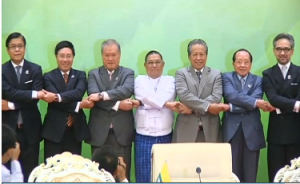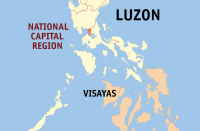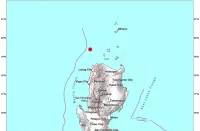
(Reuters) — Foreign ministers and heads of state of the 10-member Association of Southeast Asian Nations (ASEAN) are facing a test of unity at their summit this weekend as some members express alarm over China’s growing assertiveness in the disputed South China Sea and push for a strong joint statement.
Tensions ratcheted up in the past week after China positioned a huge oil rig in an area also claimed by Vietnam, with each country accusing the other of ramming its ships in the region close to the disputed Paracel Islands.
Myanmar Foreign Minister, Wunna Maung Lwin, addressing a press conference on Saturday (May 10), expressed the concerns of the Association of Southeast Asian Nations (ASEAN) over the surge of tensions in the South China Sea.
“We ask all the parties to resolve the issue in a very peaceful manner,” he said.
The routine annual meeting of Southeast Asian leaders has been given a jolt of urgency by a series of collisions this week between Chinese and Vietnamese vessels after China stationed a giant oil rig near the disputed Paracel islands, off Vietnam’s coast. Both sides have blamed the other, and dozens of coastguard and patrol vessels are in the area.
Tensions also spiked in another part of the oil- and gas-rich South China Sea, with Beijingdemanding that U.S. ally the Philippines release a Chinese fishing boat and its crew seized on Tuesday (May 6) off Half Moon Shoal in the Spratly Islands.
In particular, the unprecedented move by China to plant its drilling rig in Vietnam-claimed waters and guard it with dozens of ships appears likely to dominate discussions at the summit, raising questions over Southeast Asia’s efforts to agree common maritime rules in ongoing talks withBeijing.
Myanmar, whose ASEAN chairmanship this year marks a coming out on the international stage following the restoration of democracy in 2011, must walk a fine line between preserving ASEAN unity and not upsetting China, its biggest trade partner.
Asean Secretary-General, Le Luong Minh said:
“The ministers urged all the parties concerned, I mean of course this kind of general work are the parties concern. Because all the documents mentioned here concern, conduct of China and ASEAN in South China Sea.”
Singapore issued a statement on May 7 expressing concerns about recent developments and repeating previous calls for ASEAN and China to work for an early conclusion of the Code of Conduct in the South China Sea – a set of rules governing naval actions.
Tensions over the sea, which is claimed in part by four ASEAN members as well as China andTaiwan, have strained the group’s unity in recent years, resulting in an embarrassing breakdown of a summit in Cambodia in 2012.







